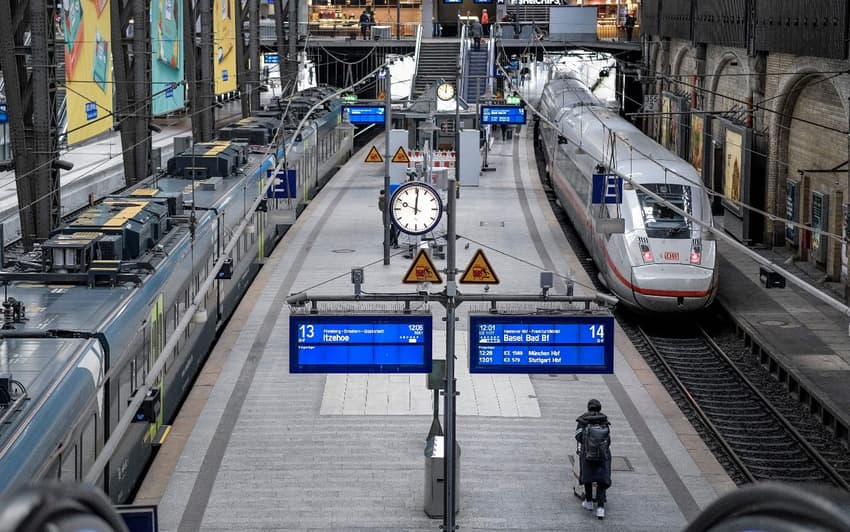Living in Germany: Swiss punctuality, Anmeldung corridors and mining history

In our weekly roundup, we look at how late German trains are irritating the Swiss, all-to-familiar corridors, and where to get a unique insight into Germany's mining history.
How German train delays impact Swiss services
Germany may be known for punctuality, but people who’ve used long-distance travel services here know that trains often run late. So we found it interesting to report this week on how this impacts other countries - in this case, neighbouring Switzerland.
The Alpine country takes pride in its trains running on time almost every time - the latest figures from the Swiss Federal Railways (SBB) says the punctuality rate is about 92 percent. But a study of trains in 2022 showed that several of the most frequently delayed trains in Switzerland began their routes in Germany. The most delayed train service in Switzerland was an afternoon Deutsche Bahn route which departs from Karlsruhe and stops in Basel. In almost 85 percent of the cases, it was more than 11 minutes late.
We asked Deutsche Bahn about these delays and a spokesperson told us that the punctuality figures for long-distance services in Germany "are currently disappointing and do not meet our standards of reliability and quality for our customers". They said they are working with the government to improve the service and infrastructure. Perhaps a good goal for Germany would be to compete with Switzerland’s punctuality rate!
Tweet of the week
Anyone who lives in Germany, or lived here in the past, and secured an Anmeldung (registration) will be familiar with these kinds of corridors and waiting rooms.
It's impressive that no matter where you live in Germany, this hallway is always the same. https://t.co/vyX6qXjBVr
— Nic Houghton (@40PercentGerman) January 31, 2023
Where is this?

Photo: picture alliance/dpa | Christian Charisius
It’s been a dramatic week for weather in Germany with snow, strong winds, heavy rain and even the odd bit of blue sky and sun. This photo captures a person walking in Hamburg during a colourful sunrise on Friday morning. In the background the masts of the Rickmer Rickmers ship and the silhouette of the Elbphilharmonie can be seen.
Did you know?
Germany’s most populous state of North Rhine-Westphalia is well known for its mining history, which used to be a major source of employment in the area. With coal production dying out, those days are gone. But you can check out the German Mining Museum in Bochum, near Dortmund, to get an insight into the soul of the Ruhr region and its history. It is the biggest museum of its kind in the world and visitors can even go underground and get a sense of what life was like unter Tage (a German colloquialism to mean 'underground' in the mines).
According to the museum, visitors can explore more than 3,000 important exhibits in around 12,000 square metres of exhibition space aboveground, which demonstrate the development of the industry.
Comments
See Also
How German train delays impact Swiss services
Germany may be known for punctuality, but people who’ve used long-distance travel services here know that trains often run late. So we found it interesting to report this week on how this impacts other countries - in this case, neighbouring Switzerland.
The Alpine country takes pride in its trains running on time almost every time - the latest figures from the Swiss Federal Railways (SBB) says the punctuality rate is about 92 percent. But a study of trains in 2022 showed that several of the most frequently delayed trains in Switzerland began their routes in Germany. The most delayed train service in Switzerland was an afternoon Deutsche Bahn route which departs from Karlsruhe and stops in Basel. In almost 85 percent of the cases, it was more than 11 minutes late.
We asked Deutsche Bahn about these delays and a spokesperson told us that the punctuality figures for long-distance services in Germany "are currently disappointing and do not meet our standards of reliability and quality for our customers". They said they are working with the government to improve the service and infrastructure. Perhaps a good goal for Germany would be to compete with Switzerland’s punctuality rate!
Tweet of the week
Anyone who lives in Germany, or lived here in the past, and secured an Anmeldung (registration) will be familiar with these kinds of corridors and waiting rooms.
It's impressive that no matter where you live in Germany, this hallway is always the same. https://t.co/vyX6qXjBVr
— Nic Houghton (@40PercentGerman) January 31, 2023
Where is this?

It’s been a dramatic week for weather in Germany with snow, strong winds, heavy rain and even the odd bit of blue sky and sun. This photo captures a person walking in Hamburg during a colourful sunrise on Friday morning. In the background the masts of the Rickmer Rickmers ship and the silhouette of the Elbphilharmonie can be seen.
Did you know?
Germany’s most populous state of North Rhine-Westphalia is well known for its mining history, which used to be a major source of employment in the area. With coal production dying out, those days are gone. But you can check out the German Mining Museum in Bochum, near Dortmund, to get an insight into the soul of the Ruhr region and its history. It is the biggest museum of its kind in the world and visitors can even go underground and get a sense of what life was like unter Tage (a German colloquialism to mean 'underground' in the mines).
According to the museum, visitors can explore more than 3,000 important exhibits in around 12,000 square metres of exhibition space aboveground, which demonstrate the development of the industry.
Join the conversation in our comments section below. Share your own views and experience and if you have a question or suggestion for our journalists then email us at [email protected].
Please keep comments civil, constructive and on topic – and make sure to read our terms of use before getting involved.
Please log in here to leave a comment.